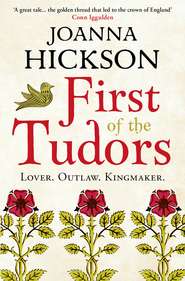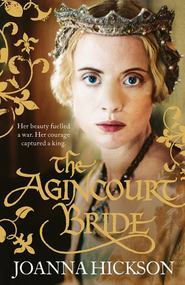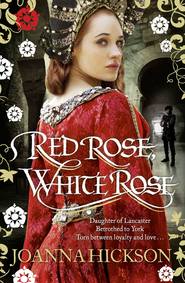По всем вопросам обращайтесь на: info@litportal.ru
(©) 2003-2025.
✖
The Tudor Bride
Автор
Год написания книги
2018
Настройки чтения
Размер шрифта
Высота строк
Поля
‘What does it mean this word “Damoiselle”, is it an English version of our “Mademoiselle?”’ Catherine asked her sister-in-law, the Duchess of Clarence.
We were all in the great solar, a royal presence chamber large enough to hold upwards of twenty people comfortably and had been listening to a new poem celebrating the royal marriage, penned by a poet called John Lydgate whom King Henry apparently much admired and patronised. It was written in English and, even though it was declaimed with great clarity by a professional player, Catherine had been frowning over the strange language and meter of the verse, so she looked quite grateful for the interruption.
‘Yes, more or less,’ allowed the duchess. The two royal ladies sat in canopied armchairs, while the young would-be maids of honour had grouped themselves around them on low cushioned stools and benches. ‘The title is used at court now to indicate a maiden of birth but not of noble blood. Her father is probably a knight ordinary, a lord of a manor but not a baron. She therefore does not merit the title “Lady”.’
‘I see.’ Catherine turned to Agnes with a smile, addressing her in French. ‘There you are then, Mademoiselle de Blagny. It seems that here in England you are a Damoiselle.’
Agnes and I were occupying a sill-seat in one of the solar’s long oriel windows, which protruded over the main courtyard of the palace and gave a clear view of the entrance to the royal apartments. We had witnessed the arrival of Gloucester’s entourage and exchanged intrigued glances as we watched the duke elbowing a squire away to personally help a young woman down from her horse in a way which had led me to assume she was at least a countess. Not so, it would seem. This must be the Damoiselle Cobham, although with the hood of her cloak pulled over her head against the chill weather, it had been impossible to see her face.
When she walked into the room, it was instantly obvious that Eleanor Cobham was a beauty; small in stature with glossy dark auburn hair smoothed under a little green veiled cap, a pale, unblemished complexion and huge black-lashed eyes the colour of violets. She was also very young, with all the grace of a yearling hind as she knelt before Catherine’s chair with her head bowed and her eyes modestly downcast, her robe a simple surcôte of pale-green wool, untrimmed and oddly old-fashioned, over a kirtle of cream linen with trumpet-shaped braid-edged sleeves. Compared to the bevy of stylish, blue-eyed blondes around her, with their bright-coloured houppelande gowns, rich fur trimmings and jewelled headdresses, she looked like a dainty wren among goldfinches.
The Duke of Gloucester bent his knee deferentially to Catherine. ‘God’s greetings to your grace,’ he said with one of his dentally perfect smiles and precise flourishes. ‘I beg to present Damoiselle Eleanor Cobham, the daughter of one of my ablest troop captains, Reginald Cobham, the lord of Sterborough. In return for valiant service under my banner at the siege of Cherbourg, I undertook to introduce his eldest unmarried daughter at court. Sadly her mother is too unwell to act in this capacity, but it came to my notice that you were appointing young ladies to your service as handmaids and attendants at your coronation, so I took the liberty of bringing the damoiselle here to Eltham, confident that you will find her entirely suitable for such a role in your train.’
Gloucester did not remain on one knee for long, moving to greet the Duchess of Clarence before stepping back to allow them both to inspect his protégée.
Catherine studied the crown of the little green cap with its pristine shoulder-length drop of white veiling. ‘Pray rise and lift your head, damoiselle, so that we may see your face, for I think it is a very pretty face,’ she said kindly, watching Eleanor’s graceful return to standing and the proud lift of her chiselled chin above the smooth, pale column of her throat. ‘But then all these young ladies display English beauty at its best, do they not, my lady of Clarence? Your daughter, Joan, not least among them.’
‘Indeed they do, your grace,’ agreed the duchess. ‘And you have wisely decided to choose your companions according to their sweetness of character and temperament, rather than their looks.’
‘Exactly,’ nodded Catherine. ‘So you see, my lord duke I cannot instantly grant any request to include the Damoiselle Cobham among them until I have enjoyed more of her company.’ Ignoring the duke’s frown of displeasure, she smiled at the newcomer. ‘Meanwhile, we are happy to welcome you, Eleanor, and I will ask Mademoiselle de Blagny to introduce you to the other young ladies and make sure you are comfortable, whilst I retire to learn more of the arrangements for my coronation from his grace of Gloucester.’
She rose from her chair and there was a rustle of skirts as we all rose with her but, before she departed, she cast a second glance at the damoiselle, who now appeared even smaller, measured against the others. ‘How old are you, Eleanor?’ she asked.
‘Fourteen, your grace.’ There was a slight hesitation and the girl blushed before adding, ‘That is to say, soon I shall be fourteen.’
‘Yes, I thought you were very young. Not yet fully grown, I think. Well, time will remedy that.’ Catherine addressed the duke directly. ‘Let us take refreshment in my privy chamber, my lord. I gather that as Great Chamberlain you have been making all the arrangements for the feast. Will you join us, Madame?’
This last was to the Duchess of Clarence, who expertly swept back her trailing skirt and followed the queen and the duke from the solar. As soon as the door was closed, a burst of chatter broke out among the assembled girls, several of whom clustered around the newcomer asking where she was from and whether they knew any of her family. Eleanor looked slightly startled, but obligingly answered their questions, although it soon became clear that her connections were not recognised.
Listening to this exchange, the French word parvenu sprang to my mind, and I noticed that while Eleanor’s eyes might be the colour of violets, there was nothing of the shy wildflower about her. In truth, this was a shameful thought on my part because if anyone was parvenu in the assembled company, it was me. However, Eleanor’s manner and dress were such as to make it obvious that here was a girl who was not from a vastly privileged background and who lacked the sophistication gifted by wealth and social position. I wondered if the Duke of Gloucester had done her any favours by dropping her in amongst these judgemental daughters of the English nobility and was minded to feel sorry for her. But at thirteen she already showed the composure of some young ladies of twenty and the cool self-containment of a high-bred cat; I decided that I could probably save my pity for those who needed it. If and when the Damoiselle Cobham entered the queen’s service, I suspected it would be only a matter of days before she displayed all the traits and skills of a seasoned courtier.
I had begun to wonder whether Catherine would ever seek my opinion of the candidates for her maids of honour and had more or less resigned myself to accepting whoever was foisted upon me, since it would inevitably fall to me to break them in, if that was the right term for showing these proud fillies how and in what ways they were expected to serve their queen with grace and humility. There were several among them who I thought might find the humility part of it hard to stomach.More encouragingly, there were some for whom it would be a natural extension of a careful upbringing. These latter were the girls I hoped would make the grade and I was gratified to have my opinion sought later that night when Catherine retired to bed.
‘Which of the young ladies shall I call to serve you tonight, Mademoiselle?’ I asked, pushing a poker into the embers of the fire ready to heat her bedtime posset.
She made a face. ‘None of them, Mette. They all look at me with such questing eyes, as if willing me to tell them they are chosen. I know their families are waiting and hoping they will be given a position. It is so important to them and I cannot bear to disappoint.’ She crossed to the prie-dieu and I thought she was about to kneel and pray, but instead she suddenly turned and wailed at me. ‘Help me, Mette! I do not know what to do.’
‘About the appointments?’ I spread my hands to indicate my hesitation. ‘What does the duchess say?’
‘She says I should take the ones I like best, but I believe the king would not think that the right thing to do. Some of them are of higher rank than others, some of their families deserve royal patronage more than others, and some would just make better attendants.’
‘Then I think you should take those,’ I said at once. ‘At least they should be at the top of the list. After all, there is no point in having people around you who are lazy or who resent the tasks they are required to do.’
‘Are there any who do that?’ She seemed surprised at the suggestion.
‘I have noticed one or two, Mademoiselle. Of course you would not see the faces they pull behind your back.’
‘No, of course not. You must tell me their names, Mette. And what about the Cobham girl – Eleanor? I think she is too young yet to be let loose about the court, but I am reluctant to offend the Duke of Gloucester. After all, he is the king’s brother.’ By now Catherine had sat down on a stool beside the hearth and was staring into the fire.
‘Why do you think the duke has singled her out?’
I tried not to inject my question with hidden meaning, but I must have failed because she glanced up at me, frowning. ‘He said it was as a favour to her father.’
‘Yes, but when does a royal duke ever owe a favour to a mere troop-captain?’ I pointed out. ‘It seems to me there is something not quite right about it.’
‘What are you trying to tell me, Mette? That the duke has lecherous intentions?’
‘I have no cause to think his grace of Gloucester unscrupulous,’ I said hurriedly. ‘The girl is very young, a beautiful child.’
She held up her hand sharply, cutting me off. ‘Yes, yes, I know. You need not say it. A young girl with her looks is always vulnerable, especially if she does not have powerful relatives to protect her. So you think I should send her back to her mother? And you are right. I will tell the duke that I will reconsider her in a year’s time. Let him be satisfied with that.’
I pulled the hot iron out of the fire and knocked the ashes off it before plunging it into a jug of spiced wine. A tantalizing aroma of fermented fruit rose in the sizzling steam.
‘And the other young ladies, Mademoiselle? Which of them will you have?’ I asked, reaching for a silver hanap from the nearby buffet.
She gave me a mischievous smile. ‘Unless you tell me they have been pulling faces behind my back, I think I will appoint the three Joans or Joannas or whatever they call themselves – they are all Jeanne to me. I know it will make for confusion, but we can use their surnames and they all seem pleasant and uncomplicated. Also Belknap and Troutbeck are from the north …’ Her brow furrowed in concentration as she struggled to pronounce the next words. ‘… Lanca-shire and York-shire I believe – and will be helpful keeping me abreast of matters in those far outposts of the kingdom. With Lady Joan and Agnes that will make five. What do you think?’
I answered her question with one of my own. ‘Do you not need six maids of honour to carry your train at the coronation, Mademoiselle? I hope you are not expecting me to line up with the young damsels.’
Catherine giggled. ‘And have the mother ewe plodding along beside the skipping lambs? No, no, Mette – that would never do. I will ask the beautiful Damoiselle Cobham to be the sixth train-bearer before she returns home to Sterborough – wherever that is. I hope that will appease the Duke of Gloucester as well as compensating the child a little. Now, Mette, tell me I am the queen of diplomacy.’
I made her a low curtsy. ‘You are the queen of queens, Mademoiselle,’ I assured her, offering the warmed wine. ‘I hope this is not so hot it scalds your grace’s sharp wits.’
4 (#ulink_2e342a22-17ca-5c06-8ea7-7589f4081e30)
‘What can I hear, Mette?’ asked Catherine when I drew back the bed-curtains at dawn. ‘It started a few minutes ago and I have been lying here listening, thinking it might be angels.’
‘It is a choir, Mademoiselle,’ I told her. ‘There are boys dressed all in white on the green below your window and they actually look rather like angels, only lacking wings. They are here to herald your coronation day.’
‘That is very special. They sound wonderful.’ Catherine made to sit up but hastily snuggled down again. ‘Blessed Marie it is cold! Those poor boys, how can they sing in this frost? They need something to warm them. Will you make sure they get hot drinks, Mette?’
‘I will send a page with your orders at once, Mademoiselle,’ I assured her. ‘But do not let your own drink get cold.’ I had placed a cup of warm buttermilk and honey at her bedside. I held out her chamber robe and with reluctance she shed the covers, quickly stepping down from the bed to don the fur-lined robe. ‘The fire has been burning all night so you can warm yourself at the hearth.’
At last the day of her coronation had arrived and, following a tradition begun by England’s first King Henry, Catherine had spent the night in the Tower of London.
The previous morning she and the king had left Eltham at dawn, mounted on white horses, bells jingling on their harness and tasselled trappings of scarlet and blue boldly displaying the lions of England and the fleurs-de-lys of France. They were met on Blackheath Common by the city’s mayor and aldermen who had ceremonially escorted them through the narrow shop-lined thoroughfare that crossed London Bridge and into the crowded and festooned streets of the city. I had not taken part in the parade that followed, but Catherine had excitedly described it when she returned at dusk.
‘London is magnificent, Mette. Hundreds of bolts of cloth of gold had been distributed by the Guild of London Mercers and hung from the windows of the houses where they billowed in the breeze, turning the streets into a golden pathway. It was truly magical. A holiday had been declared and the roads were free of foul-smelling rubbish and lined with young girls in white kirtles with baskets full of dried herbs and rose-petals to throw under our horse’s hooves so that we smelled only fragrant perfumes as we rode. For the duration of the parade the fountains ran with wine, although as you know King Henry has an abhorrence of drunkenness and had ordered it diluted with spring water. Even so, there were plenty of people in very high spirits. Spectators crammed every vantage point, blowing trumpets and horns, and some of the more agile citizens leaned from attic casements or perched on rooftops and even clung to church steeples to get a clear view. I was fearful that someone might fall, but no one did, as far as I know.
‘There was plenty for them to see. On raised platforms at each crossroads mummers staged biblical tableaux celebrating marriage and monarchy and outside every church on the route choirs sang psalms and anthems. Fifty knights of the king’s retinue rode before and behind us flying their brightly coloured standards and wearing full suits of armour, which glinted in the sunshine. Then, mounted on bright chestnut palfreys behind them were my six maids of honour attracting deafening cheers and whistles – and so they should have, in their blue fur-trimmed mantles and sparkling jewelled headdresses. We made a circular route through the centre of the city, stopping at St Paul’s church to hear a celebration mass, and then to a feast in the Guildhall before returning along the river, past moored barges, docks and warehouses all decked with flags and crammed with more cheering crowds of people. I have to admit that today we were more enthusiastically greeted than when we rode into Paris last Christmas.’
I had left the royal cavalcade after crossing London Bridge and ridden with the household servants and baggage straight to the royal apartments in the Tower of London, on the city’s eastern flank. The quiet of the inner ward, where I had spent the day supervising the queen’s unpacking, was suddenly broken by the fanfare of trumpets. I found a window from which to watch the returning procession as it clattered over the drawbridge that spanned the moat, past the Lion Tower where the king’s animals were housed, through the massive gatehouse, under another gatehouse and into the inner ward. Steam rose from the horses’ flanks and the riders’ cheeks were flushed bright red, their breath condensing in the icy air as daylight faded. A hot tub awaited the queen before a blazing fire, not only to warm a body stiff and chilled by the February wind, but even more importantly to begin the purification process essential before the divine rite of coronation.
The queen would make a lone vigil ahead of the solemnity of coronation. Having escorted his queen formally to her lodgings, the king immediately rode away again to Westminster, leaving the Archbishop of Canterbury with Catherine in the royal chapel of St John. The archbishop spent an hour explaining the vows she would be taking and the indelible nature of the sanctity which anointment with the holy chrism would bestow. When she emerged, she looked pale and slightly dazed and went immediately to the small oratory beside her chamber, where she dropped to her knees before the portable altar that always travelled with her with its precious triptych of the Virgin.
Each of the maids of honour had been given particular duties regarding the queen’s personal grooming – meticulous washing, trimming and brushing and the application of fragrant unguents – but I knew that if Catherine wished to pray, these treatments would have to wait. The wooden tub, draped in fresh white linen and set before the fire in the royal solar, had to be refreshed with hot water and re-draped three times before the queen felt that the preparation of her mind and soul for coronation could give way to the smoothing and soothing of her body and its ritual cleansing.
I waited with her in the little oratory, standing quietly in the deep shadows cast by the flickering wax pillar candles. When she rose from the prie-dieu and turned to leave, she noticed me there, smiled at me wistfully and moved close to whisper, ‘I do not feel worthy, Mette. I fear the filth of Burgundy will never be prayed away.’









